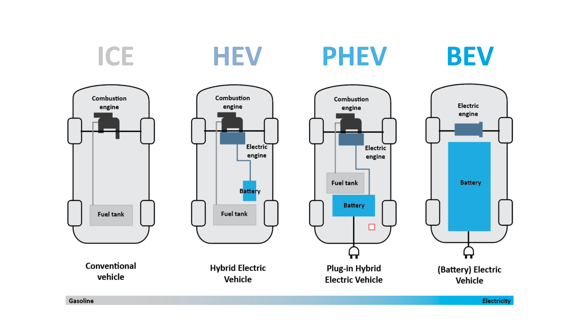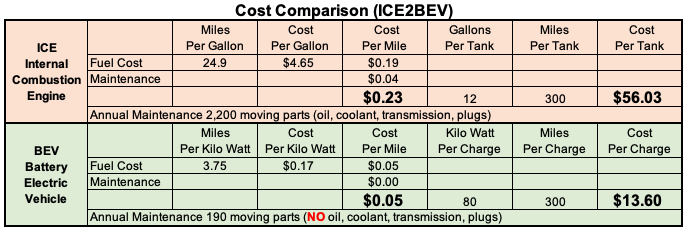ZEV Zero-Emmission Vehicles
The End Of The Ice Age
Internal Combustion Engine (ICE) -vs- Battery Electric Vehicle (BEV)

There are four basic types of technology currently in the market place for cars:
- ICE: Internal Combustion Engine: Traditional standard gasoline combustion engine. The battery is mainly used to crank the engine.
- HEV: A Hybrid vehicle that has both a gasoline combustion engine and an electric engine (NON plug-in). The batter is mainly used to boost the engines overall power and energy efficiency.
- PHEV: Plug-In Hybrid Electric that has an electric engine ‘and’ a gasoline engine. The battery is mainly used while driving shorter distances (first 25-40 miles), and after that the battery is used to boost the engines overall power and energy efficiency.
- BEV: A state-of-the-art ALL electric engine with batteries known as a Battery Electric Vehicle or a Plug-In Electric Vehicle (PEV). No gasoline engine. The battery fully supports the vehicle.
Technology Review:

As we move toward electric vehicles like Tesla, Volkswagen, GM, Ford, and with others on the way from Honda, Nissan, Mercedes and Fiat … below is a short review the pros and cons of electric cars as they now exist. Below are the things to consider prior to choosing one vehicle over another. If you want a chart of the cars and their manufacturers, please email us and we will send you my side-by-side comparison.
Strengths (Pros):
- Green Is Good Economic Power: Leaving aside the environmental benefits, which are considerable, all-electric cars and their hybrids mean freedom from oil addiction and saying goodbye to its related constraints is a big motivator.
- Cheap Fuel: Average cost of $13 for BEV versus $56, for an average 300 miles, is important to note. That gap will become even wider if gas prices rise in the coming years.
- Less Maintenance: Because they don’t have to deal with the heat and force generated by an unending series of powerful explosions the way combustion engines do, electric engines don’t need the oil changes and other regular maintenance that conventional engines need to stay running. That can add up to significant savings over time.
- Tax Credits: Significant state and federal tax credits, along with grants and rebates, will be around for many years to come.
Limitation (Cons):
- Range: Current battery technology is matching the energy stored in a regular tank of gasoline. Electric passenger vehicles can now go upwards of 350 miles on a single charge. That means in the near future, ALL electric cars will have even more range than comparable combustion cars, as they exceed electric storage capacities greater than 600 miles per charge.
- Prices: An average BEV cost of $30-40,000; as compared in contrast, to a standard ICE car will cost around $25-35,000.
- Options: Owners keep their cars. There likely won’t be as large a used inventory of electric cars for years.
- Infrastructure: Public charging stations are not as frequent as gasoline stations currently … however, many many more charging stations outside of the standard gasoline station are coming online each day at the work place and many public destinations.
- Charge-time: Average wait times can be upwards of 30-60 minutes or more to “fill up your tank”. At home you’ll want a Level 2 ‘faster’ charger installed, potentially adding $650 more to your electric-car price tag.
If you are thinking about going all electric, there are a few things to consider before you drive it home:
- Are you buying a plug-in hybrid or a battery electric car?
- Is your home’s electrical panel and wiring configured to enable you to charge the battery in your car?
- What is the best rate plan for you to charge your vehicle on?
- What is the best time for you to charge your vehicle?
- Do you need to hire an electrical contractor?
- Will you need to obtain city permits for any electrical work?
